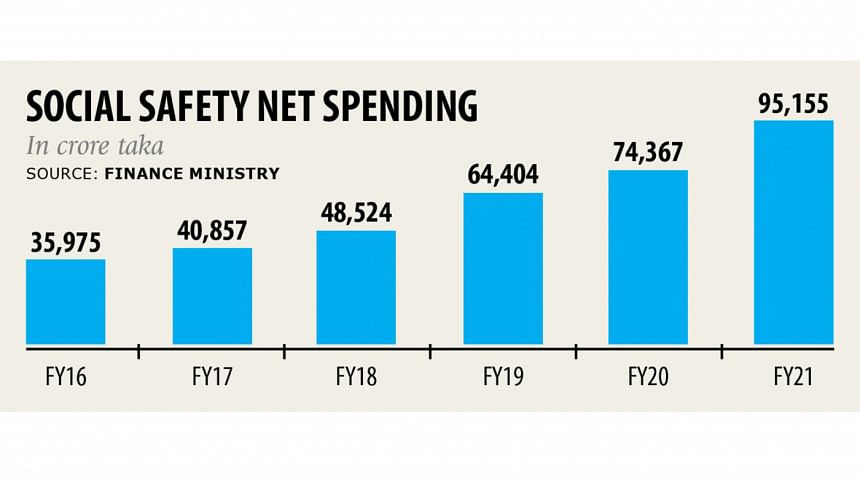Safety net outlay to hit 3pc of GDP for first time

The government may allocate Tk 95,155 crore for the safety net programmes in the next fiscal year as it looks to broaden the number of beneficiaries to support those who are struggling to make ends meet after the coronavirus outbreak.
The allocation would be 27.95 per cent higher than Tk 74,367 crore set aside in the current fiscal year and 3 per cent of the gross domestic product of Bangladesh, according to an official of the finance ministry.
The allocation was 2.58 per cent of the GDP in FY2019-20.
Millions of people have lost their jobs owing to the countrywide shutdown enforced from March 26 to flatten the curve on the deadly virus.
Due to the income shock caused by the pandemic, 77.2 per cent of the vulnerable non-poor fell below the poverty line, according to a joint survey of the Power and Participation Research Centre (PPRC) and the Brac Institute for Governance and Development.
This would imply that beyond the 20.5 per cent of the population officially recognised as poor, there is a group of "new poor" representing an additional 22.9 per cent of the population that needed to be brought within the discussion on poverty.
About 74 per cent families have seen a reduction in income because of the coronavirus pandemic, a joint study of Brac, Data Sense and Unnayan Shamannay showed.
The situation prompted the government to beef up the spending for the social safety net programmes (SSNPs) by Tk 20,788 crore in FY2020-21, starting on July 1.
The allocation per beneficiary would not go up in terms of amount; rather, the number of beneficiaries would increase.
The government is boosting the allocation for eight core safety net programmes, especially those of food-based ones. There are 81 lakh beneficiaries under the schemes and that number will rise by 10 lakh.
The number of widows, destitute and deserted women entitled to Tk 500 per month support from the government would increase by 8.5 lakh. Another 2.5 lakh would be added to the list of the financially insolvent disabled, who receive Tk 750 a month.
The number of beneficiaries receiving maternity allowance would go up by 10 per cent. Currently, 750,000 individuals get such a payment.
The government's strategy to expand the SSNPs as one of the four strategic priorities for FY21 needs to be proactively pursued, the Centre for Policy Dialogue said in a virtual briefing on Sunday.
The government should allocate at least 3 per cent of the GDP for the SSNPs as outlined in its National Social Security Strategy formulated in 2015, it said.
The government has prepared a list of 50 lakh households as beneficiaries to be covered under its support programme in response to the coronavirus pandemic.
"The government should take support of NGOs and local-level social organisations in identifying, selecting and distributing the support, and to address inclusion and exclusion bias in selection process and adopt a whole of society approach," the CPD said.
The food and cash support has become crucial as a major portion of the population is facing food insecurity because of the pandemic, Hossain Zillur Rahman, executive chairman of the PPRC, told The Daily Star recently.
There are a lot of questions whether the listing of the beneficiaries is being done properly and the support is being distributed appropriately, he said.
The SSNPs also include the pension going to the civil servants. If the allocation for the retired government employees and their families is excluded, the SSNP budget for the poor would reduce significantly, according to Rahman, also the chairperson of Brac.
So, the real allocation for the poor should be clear, he said.
The allocation for the pension has been kept unchanged at Tk 23,010 crore for the FY21, which is 31 per cent of the total SSNP budget in the FY20 and it would be 24.18 per cent in FY21.
Excluding the allocation for the pensioners and their families, the total SSNP budget stands at Tk 72,145 crore, which would be 2.50 per cent of the Tk 2,885,872-crore GDP of Bangladesh.
The government should step up to introduce schemes for the urban poor as most of the programmes target beneficiaries in the rural areas, Rahman said.
"We don't have any programme for the urban poor in that sense. From the coronavirus pandemic, we came to realise in a big way that the urban poor is the new unaddressed poor. It would be better if there is an explanation how much of the safety net programmes is going to the urban poor."
Safety net programmes in Bangladesh have been contributing to the reduction of poverty and vulnerability by addressing a range of population groups through different forms of assistance, the World Bank said.
These include the provision of income security for the elderly, widows, and persons-with-disabilities, generating temporary employment for working age men and women, and supporting the healthy development of young mothers and children.
The government aims to double the budget allocation in the SSNP sector in the next five years.


 For all latest news, follow The Daily Star's Google News channel.
For all latest news, follow The Daily Star's Google News channel. 



Comments